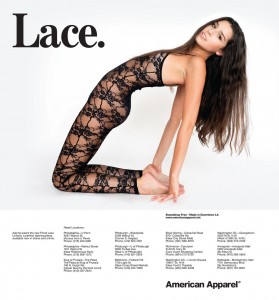The Benefits of Starting Off Sustainable
We spoke a few classes back on American Apparel, and how it has been working to make its products and its business practices green since its inception. The team that presented this case mentioned that, initially, American Apparel tried to position itself as an environmentally-friendly clothing line, but the strategy failed. The brand only became successful when it advertised itself as an edgy, hip line for young adults. The question was asked whether American Apparel has any incentive to hold onto its environmental practices now that most people don’t even realize that it is a relatively sustainable company.
I want to elaborate on what I said in class. Basically, my argument was that they should definitely continue to conduct their business in a sustainable manner. My reasoning stems from the fact that, nowadays, many companies are trying to play catch-up as they realize that resources are depleting and consumers are demanding green products. They’ve had systems in place for decades that have allowed them to survive and thrive as a business. And now in several cases, they’re having to completely change those systems if they want to go green, and it can be extremely difficult and costly.
Water bottles are a great example of this issue. I know I touched on plastic bottles in a previous blog post, but this is a product that was developed with profits in mind, and without a long-term strategy about how they might affect the planet. Now producers are scrambling around trying to alter their product or production methods in order to accommodate environmental demands. While some companies are being awarded for tackling this issue through innovation–like Coke for their PlantBottle technology–would it not have been cheaper if a sustainable bottle had been developed in the first place? Coke could have saved themselves some hefty R&D costs.
American Apparel has a distinct advantage here. They have been striving towards sustainability since the beginning, so they will not likely have to make the same drastic changes as other companies. At the same time, as we have talked about in class, if environmental standards are set in the future that are mandatory for businesses, American Apparel could be ahead of the game if they already meet those standards. And I think customers and competitors alike would respect them for that.
William McDonough described the first industrial revolution as “an aggregation of a lot of individual acts based on specific opportunity. It wasn’t designed as a whole system.” I think this means that if companies had been forward-thinking a long time ago, we could have avoided these problems by instilling sustainable systems from the start.

Hi Jessica, thanks you for writing this post. I actually think about this all the time as a business student who always has sustainability on her mind. Logically, a company that starts off sustainable requires less effort to remain sustainable and on the flip side it takes more effort to integrate sustainability into your business if you did not start off with a sustainable business model.
I’ve always wrestled with a company like American Apparel where they can’t seem to get success from advertising their sustainability and have to resort to more extremes to companies like TOMS who are all about marketing their green. It almost feels like you need to be a certain size to be successful with starting green. Do you think that consumers see the sustainable impacts of the laggards/reactors as more of an effort and appreciate it more than a company that starts out sustainable?